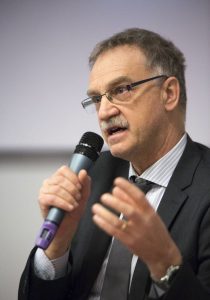
address : The MOSE Laboratory
University of Trieste
Piazzale Europa 1
34127 Trieste
ITALY
phone : +390405583750
Approval date : 26/9/2006
The MOSE laboratory is active within Department of Engineering and Architecture (DEA) since 1995 and deals with theory, simulation, modeling, and experiment in the areas of materials and life science.
In the Third Millennium “sustainability” is increasingly becoming a key social, political, scientific and engineering issue. Indeed, there are increasing signs that sustainability will become a major new paradigm influencing the society of tomorrow and the engineering it requires. With their knowledge of chemistry and physics, mass and energy flows, and process technology, chemical engineers are in a pre-eminent position to play a major role in implementing sustainable development.
The sustainable development, which can very simply be defined as a process in which one tries not to take more from nature than nature can replenish, can be obtained without sacrificing the many benefits that modern technology has brought. The only problem is that technology respects the imposed constraints. Engineers are asked to do this by designing new processes and/or by modifying existing processes aiming at using renewable resources and producing by products that can be returned to the earth.
Process Simulation and Optimization can play a dramatically important role in the decision-support system in the framework of sustainable development by allowing engineers to perform process screening and a priori analysis on the feasibility of a given industrial plant as well as performing simulation of performances of waste water treatment and air pollution control. Integration of three fundamental topics (i) steady state process simulation, (ii) environmental simulation and (iii) process control can give, in the framework of the sustainable development theory, a solution for a decision-making system in developed and developing countries.
This long lasting project objective is to transfer the technology of process simulation to developing countries by using different tools: training courses, advanced focused training activities and training on the job. Scholarships targeted to specific problems are also included in the project.
As of January 1, 2021, Universita di Trieste is an Associate Member in Group C as per the bylaws adopted on October 15, 2020.
Publications and work related to CAPE-OPEN
Letitia TOMA has been the major actor with respect to CAPE-OPEN, developing CAPE-OPEN Unit Operations and making use of them within different process simulators for the purpose of evaluation the sustainability of processes. Marco PARENZAN has contributed also to the creation of a Wizard for developing CAPE-OPEN Unit Operations in .NET.
Maurizio FERMEGLIA, Gennaro LONGO and Letitia TOMA attended the CAPE-OPEN 2007 Annual Meeting and presented a communication on their implementation of the WAR algorithm as a CAPE-OPEN Unit Operation.
Prof. FERMEGLIA attended the CAPE-OPEN 2021 Annual Meeting.
The research work conducted by Letitia TOMA under the supervision of Maurizio FERMEGLIA and Gennaro LONGO led to the following publications:
- Fermeglia M., Longo G,. Toma L. (2007), Development of a Process Sustainable Prediction (PSP) framework, Chemical Engineering Transactions, vol. 11, pp. 761-766.
- Fermeglia, M., Longo, G. and Toma, L. (2007), A hierarchical approach for the estimation of environmental impact of a chemical process: from molecular modeling to process simulation, Computer Aided Chemical Engineering, vol. 24, pp. 1199-1204.
- Fermeglia, M., Longo, G. and Toma, L. (2009), Computer aided design for sustainable industrial processes: Specific tools and applications. AIChE J., 55: 1065–1078.

